Romanian singer Angela Similea (1946) was one of the most famous Muzică ușoară (Romanian easy listening music) stars in the 1970s and 1980s. She also appeared in the popular Romanian film Rămăşagul (Ion Popescu Gopo, 1985).
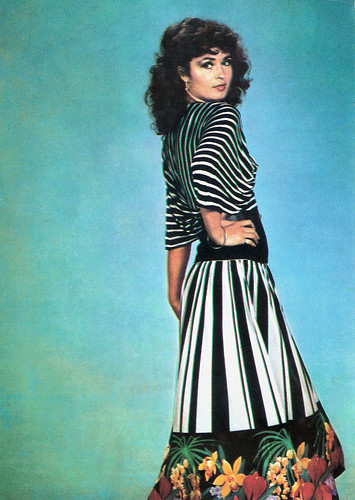
Romanian postcard by Casa Filmului Acin.

Romanian postcard by Casa Filmului Acin.
Angela Similea was born in 1946 in the 1 Decembrie commune, Ilfov County, Romania. She was the oldest of the three children of Petre and Gherghina Similea.
As a child she was already attracted to music. Although she was very shy, she used to sing when she was travelling with the tram to the discomfort of her mother. As a teenager, she attended a concert by Maria Tanase, which inspired her to choose for a singing career.
However, her mother forced her to choose a ‘decent job,’ and to study to become a paediatrician. During high school, music teacher Marin Teofil discovered Angela’s singing talent, and spoke about it to the composer George Grigoriu, who then led the UTC ensemble.
She established that Angela could take singing lessons with Florica Orăscu. Orăscu worked with many other performers of Similea’s generation, such as Aura Urziceanu, Dida Dragan, and Olimpia Panciu.
Florica Orăscu believed that Similea had a ‘too crystalline’ voice, and recommended that she would start to smoke. After a relatively short period, Angela Similea's voice matured, descended and became deeper.
In 1965, she started to sing as an amateur, and obtained the third place in the amateur artists' festival. She sang V. Veselovski's song Câmpia sub lună (Plain under the Moon), which won the First Prize at a festival in Bucharest.
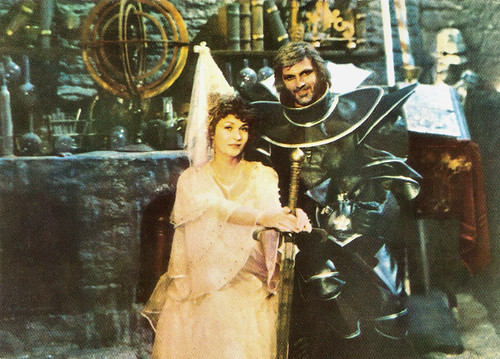
Romanian postcard by Casa Filmului Acin, no. 43 157. Publicity still for Rămăşagul (Ion Popescu Gopo, 1984) with Florin Persic.
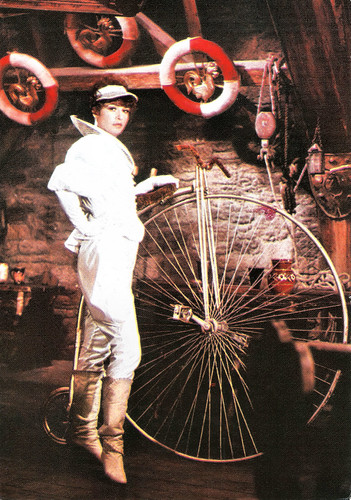
Romanian postcard by Casa Filmului Acin.
Angela Similea won many awards during the 1970s. Her first success was a second prize at the Cebul de Aur (Golden Stag) International Festival in 1970 where he won the Silver Deer. She made her TV debut in the show-contest Emoții (Emotions) where she sang the songs Așa ești tu (So you) and Guantanamera.
In 1971 she launched George Grigoriu’s song Amurgul, with which she won the special jury prize at the Ancora Decinului contest in Czechoslovakia. In 1972, she got the second place at the Golden Orpheus Festival in Bulgaria, with the song Tu ești primăvara mea (You are my spring) by Florin Bogardo. In 1977, the singer won the first prize at the Mamaia Festival for Un albastru infinit (Infinite Blue), composed by Marcel Dragomir.
In 1985 she appeared as a fairy in the film Rămăşagul (Ion Popescu Gopo, 1985), with the known Romanian film stars Iurie Darie and Florin Piersic. The film is based on the 19th century children's story Purse with Two Coins by the Romanian writer Ion Creanga.
Rămăşagul is a self-referential fantasy, complete with musical and animated interludes plus a cast of fairy-tale characters. It tells the story of an old man (Ion Lucian) who makes a bet with a fairy (Similea) that he can hide a bag with two golden coins from her for a week.
Throughout her career Similea managed to collaborate with some of the best Romanian composers, including Ion Cristinoiu, Marcel Dragomir, Marius Teicu and Zsolt Kerestely. In 2000, her song Să mori de dragoste rănită (To Die of Wounded Love), composed by Marcel Dragomir, on lyrics of Aurel Storin, was declared "the 20th century song" by the Romanian public during a TV gala.
After ten years of absence, Angela Similea returned to the music market in 2005 with a new album, entitled Lumea mea (My World). Angela Similea was married to politician Victor Surdu, who died in 2011. In 2014, Similea returned to the cinema in the comedy Scurt/4: Istorii de inimã neagrã (Andrei Cretulescu, Radu Jude, Luiza Parvu, Julia Rugina, 2014). She also appeared in the short film Sã mori de dragoste rãnitã/Dying from a wound of love (Iulia Rugina, 2014).
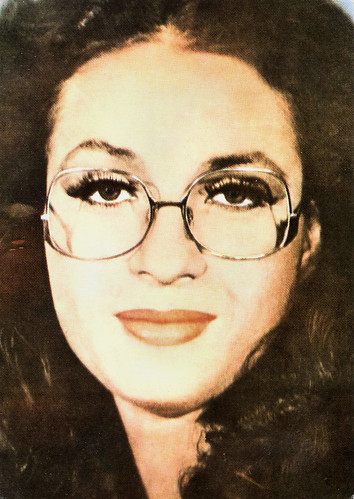
Romanian postcard by Casa Filmului Acin.
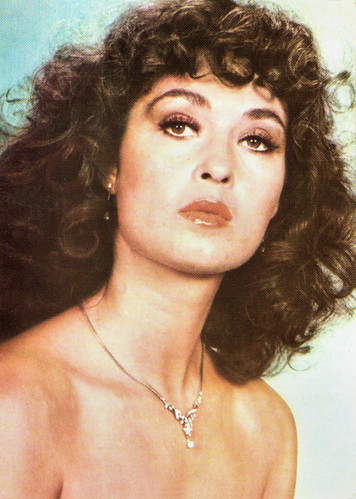
Romanian postcard by Casa Filmului Acin.
Angela Similea sings Casa mea. Source: raffaelo34 (YouTube).
Sources: Wikipedia (Romanian) and IMDb.

Romanian postcard by Casa Filmului Acin.

Romanian postcard by Casa Filmului Acin.
Smoking to get a less crystalline voice
Angela Similea was born in 1946 in the 1 Decembrie commune, Ilfov County, Romania. She was the oldest of the three children of Petre and Gherghina Similea.
As a child she was already attracted to music. Although she was very shy, she used to sing when she was travelling with the tram to the discomfort of her mother. As a teenager, she attended a concert by Maria Tanase, which inspired her to choose for a singing career.
However, her mother forced her to choose a ‘decent job,’ and to study to become a paediatrician. During high school, music teacher Marin Teofil discovered Angela’s singing talent, and spoke about it to the composer George Grigoriu, who then led the UTC ensemble.
She established that Angela could take singing lessons with Florica Orăscu. Orăscu worked with many other performers of Similea’s generation, such as Aura Urziceanu, Dida Dragan, and Olimpia Panciu.
Florica Orăscu believed that Similea had a ‘too crystalline’ voice, and recommended that she would start to smoke. After a relatively short period, Angela Similea's voice matured, descended and became deeper.
In 1965, she started to sing as an amateur, and obtained the third place in the amateur artists' festival. She sang V. Veselovski's song Câmpia sub lună (Plain under the Moon), which won the First Prize at a festival in Bucharest.

Romanian postcard by Casa Filmului Acin, no. 43 157. Publicity still for Rămăşagul (Ion Popescu Gopo, 1984) with Florin Persic.

Romanian postcard by Casa Filmului Acin.
Dying from a wound of love
Angela Similea won many awards during the 1970s. Her first success was a second prize at the Cebul de Aur (Golden Stag) International Festival in 1970 where he won the Silver Deer. She made her TV debut in the show-contest Emoții (Emotions) where she sang the songs Așa ești tu (So you) and Guantanamera.
In 1971 she launched George Grigoriu’s song Amurgul, with which she won the special jury prize at the Ancora Decinului contest in Czechoslovakia. In 1972, she got the second place at the Golden Orpheus Festival in Bulgaria, with the song Tu ești primăvara mea (You are my spring) by Florin Bogardo. In 1977, the singer won the first prize at the Mamaia Festival for Un albastru infinit (Infinite Blue), composed by Marcel Dragomir.
In 1985 she appeared as a fairy in the film Rămăşagul (Ion Popescu Gopo, 1985), with the known Romanian film stars Iurie Darie and Florin Piersic. The film is based on the 19th century children's story Purse with Two Coins by the Romanian writer Ion Creanga.
Rămăşagul is a self-referential fantasy, complete with musical and animated interludes plus a cast of fairy-tale characters. It tells the story of an old man (Ion Lucian) who makes a bet with a fairy (Similea) that he can hide a bag with two golden coins from her for a week.
Throughout her career Similea managed to collaborate with some of the best Romanian composers, including Ion Cristinoiu, Marcel Dragomir, Marius Teicu and Zsolt Kerestely. In 2000, her song Să mori de dragoste rănită (To Die of Wounded Love), composed by Marcel Dragomir, on lyrics of Aurel Storin, was declared "the 20th century song" by the Romanian public during a TV gala.
After ten years of absence, Angela Similea returned to the music market in 2005 with a new album, entitled Lumea mea (My World). Angela Similea was married to politician Victor Surdu, who died in 2011. In 2014, Similea returned to the cinema in the comedy Scurt/4: Istorii de inimã neagrã (Andrei Cretulescu, Radu Jude, Luiza Parvu, Julia Rugina, 2014). She also appeared in the short film Sã mori de dragoste rãnitã/Dying from a wound of love (Iulia Rugina, 2014).

Romanian postcard by Casa Filmului Acin.

Romanian postcard by Casa Filmului Acin.
Angela Similea sings Casa mea. Source: raffaelo34 (YouTube).
Sources: Wikipedia (Romanian) and IMDb.
No comments:
Post a Comment